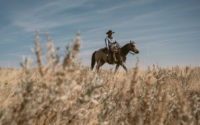Flock of Dimes’ “It Just Goes On”
Last year, I wrote about Flock of Dimes’ electro-pop jaunt “Two,” which examined the strained desire of wanting companionship while prizing independence. It’s a tension I knew well at the time and Wasner captured it so beautifully—all in an upbeat sheen that juxtaposed the more serious introspection at the heart of the song.
Wasner is gearing up to release ephemera from her gorgeous 2021 album Head of Roses, which includes a few songs that swirled along the margins of that project, alongside live takes and covers. It’s called Head of Roses: Phantom Limb, and like the title suggests there’s a present absence hovering over the new songs—the relationship that raised so many doubts on Head of Roses fades into the background but isn’t entirely gone.
“It Just Goes On,” the first song to arrive, unfurls in late evening color, just as the moody blues of dusk sweep across the sky. In the melancholy guitar strums and saxophone flickers that open the song, Wasner’s expansive voice begins posing questions. “If I knew your mother/ If I loved your friends/ If I promised I would never ask for anything again,” she sings, unspooling each line as though it were a thread she were tracing.
She frames the inquiry with “Ifs” sans question marks. These aren’t real matters that require answers—these are the crumbs that trail a relationship’s end, the kinds of inquiries you make of yourself and the time you’ve spent with another. Each “what if” looks both back and ahead while the parallel universes multiply.
Wasner’s voice comes slow and saturated throughout the track. “If my body was smaller and easier to hold/ If I was one instead of another, someone calculated and cold/ But what’s another story? If a story isn’t told, it just goes on,” she sings, her voice blossoming with sustain before she cuts it short, as if tiring of the thought just as she finishes it. Each possibility feels weighted but ultimately futile to consider.
For all the questions Wasner asked herself on Head of Roses, “It Just Goes On” is largely aimed at another, though the larger bent of the song feels closer to a reminder—a signal beaconing in the dark that you will be ok, that you haven’t lost yourself in losing someone you loved. “Nothing I do would have mattered to you/ See I can, if you don’t want me, I still am,” she sings.
In imagining the possibilities, Wasner discovers her resiliency. There’s no need for any other answer except “onwards.”



